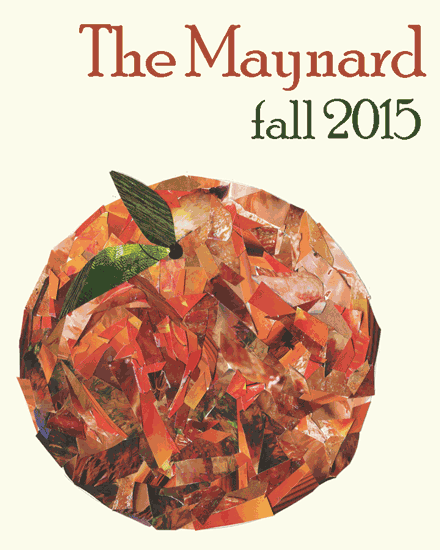fall 2015
Table of Contents
Return to Home PageIntroduction
A Monday The Devil Valentina Cano
The Day Everyone Realized Ron Riekki
Darkening Over Still Water Richard King Perkins II
Why, And for What Purpose![]() Is There Something
Is There Something![]() Ace Bogess
Ace Bogess
Can't Stomach Mitchell Grabois
In the Cyberspace Icicle Changming Yuan
Girl I![]() Girl II
Girl II![]() Carolyn Supinka
Carolyn Supinka
The Insidious Susurration![]() A Conversation
A Conversation![]() Marie-Andree Auclair
Marie-Andree Auclair
Saturday Night![]() Charles Springer
Charles Springer
Brains Lost to the Earth Melissa Nelson
Yellow Flowers![]() The World Dream
The World Dream![]() Ann Filemyr
Ann Filemyr
A Fire Hydrant on Camino de la Amapola![]() Good to See You
Good to See You![]() Eleanor Kedney
Eleanor Kedney
(Ouverture) Garry Thomas Morse
The Story of Chitin Giri Zoe Dagneault
what do you talk about![]() desire derives pleasure
desire derives pleasure![]() aren't we missing every thing
aren't we missing every thing![]() gary lundy
gary lundy
Alcohol![]() Fast-slow Continuum
Fast-slow Continuum![]() Peycho Kanev
Peycho Kanev
The Stale Cold Smell of Morning![]() Angela Rebrec
Angela Rebrec
revenge/reincarnation annie ross
the neighbors knew i divined water![]() Hell is hot
Hell is hot![]() Allison DeLauer
Allison DeLauer
Word on the Street![]() Henry Rappaport
Henry Rappaport
Fault Vodka / Blame Juice Jamie Sharpe
QED A Moth In Rain Christopher Patton
a rose is a rose is a rose manhattan Nikki Reimer
Introduction
Here, at The Maynard, we don’t like themed issues. We’re interested in excellent poetry. For us, an excellent poem is one that takes risks, contains an unapologetic voice, is intent on its subject, and teaches us something about what it means to be a human or a robot (read: Zoe Dagneault’s Story of Chitin Giri). So, for us, the editing process for each issue starts with the submissions. Each selected poem, creates and contributes in its unique way to the high-stakes and necessary conversation taking place between the poems in the issue, as well as across the poetry community at large.
Editing the Fall issue of The Maynard has been intense, precious fun. After the anticipatory work of calling for submissions and responding to inquiries, we read and re-read 390 poems as they bounced between ‘accepted’, ‘not accepted’ and ‘maybe’, only to bounce again the next day. We spent weeks reading individually, followed by hours and hours of discussion and reading aloud to one another, convincing, negotiating, picking apart poems as if to scream to each other ‘Listen! Don’t you hear how great this is?’ We noticed that even when we stepped away from the immediate engagement with the work, there was an image, a line, a quality of voice that kept knocking on our psychic doors. Those are the poems we selected for this issue.
32 voices—16 women and 16 men—and 45 poems are featured in this issue. We strived for parity, though there’s one more poem on the men’s side. We felt Gary Lundy’s poems created a ‘family’ of experience that was more whole if the poems were presented together. On the women’s side, we feature our first video poem by digital artist Evie Ruddy. For Jo Baeza, this is her first publication of a poem in a peer-reviewed forum. There were a few battles between us; Nick couldn’t let go of the quixotic solitude in Charles Springer’s Saturday Night, which speaks from a similar landscape and determination as Baeza’s poem. Jami held out for the deftly crafted and subtly wrought Can’t Stomach by Mitchell Grabois. Peycho Kanev and Valentina Cano seem to be on the same night bus, speaking under their breath; Fraser Sutherland’s Tribute, Jamie Sharpe’s Fault Vodka / Blame Juice, and Pattie Flint’s After a Fashion made us laugh out loud. Nikki Reimer’s sprawling, labyrinthine piece contrasts with Christopher Patton’s three quick, bizarre poems.
One of the benefits of The Maynard’s online format is that the order of the poems in each issue changes with each visit. As a collection, the poems in each issue present non-sequiturs like oranges, and offer a kaleidoscopic arena where new poetic harmonies and dissonances emerge, seldom if ever (statistically speaking), to be re-witnessed.
Indeed, collage is the new (old)school; orange is the new rhyme. We marveled at 31 submissions for cover art—five times what we’ve received for past issues. We feel privileged to have received so many imaginative portrayals of oranges, although narrowing it down to one unifying, emblematic image to accompany the poems was no easy task. We settled on Ebony Jansen’s collaged orange, Glad I didn’t say.... We’re drawn to its qualities of the messy and compounded, magnetic and complex. Its apparent formal simplicity contains a cacophonous texture and layered density. That’s the way we’d describe the poems in the issue as well.
Now, we invite you to join the conversation as you read and listen to these poems, gathered here as they are.
Happiness to your eyes and ears and hearts,
Jami Macarty and Nick Hauck
Advisory Board and Editors (Fall issue)

